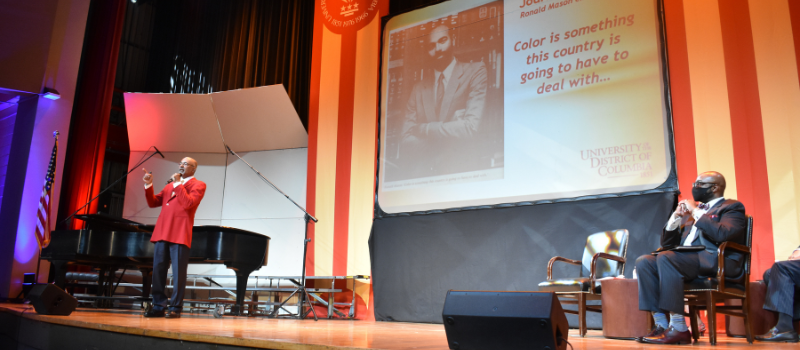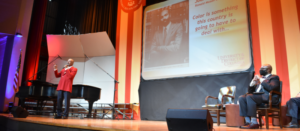
Fall Convocation highlights University’s past and present
Fall Convocation highlights University’s past and present

President Ronald Mason Jr. and Chief Academic Office Dr. Lawrence T. Potter at the UDC Theater of the Arts during Fall Convocation on September 22, 2022.
The energy was high as President Ronald Mason Jr. gave the keynote speech and highlighted the accomplishments at the University of the District of Columbia as he continues as the University’s longest-serving president. This year’s theme was “One UDC: Stepping Forward Together!”
Chief Academic Officer Dr. Lawrence Potter Jr. welcomed students, faculty and staff along with greetings from Christopher Bell, chair of the Board of Trustees, during the Fall Convocation.
“I think that to be a student here is like winning the lottery,” Bell said. “There are so many issues in the world where we need bright, new and creative ideas. You are in Washington, D.C., one of the greatest cities in the United States. It is a laboratory for democracy, and then you are at UCD with the best faculty, staff and administration. We are thrilled that you are allowing us to help you learn and grow. On behalf of the Board of Trustees, thank you for putting your trust in us.”
The District of Columbia Fire and EMS Honor Guard provided the presentation of colors, followed by musical selections from the UDC Chorale. Miss and Mister University of the District of Columbia, Kendra Williams and Jamil Mian, addressed the audience, and Dr. Andrea Adams, acting chair, Faculty Senate.
General Counsel Avis Russell introduced Mason, describing him as a mentor and friend with a legacy of support for the people and institutions he has led.
“Ron has provided stability and innovation to UDC,” Russell said. “Under his leadership, the University’s budget has increased, and the campus infrastructure has improved. New academic programs, including Ph.D. programs, have been added, and student outcomes are improving. Ron is a transformative leader. He will do what he can to leave us better than he found us.”
Mason kept his remarks light, using humor in his presentation, and walked off the stage at one point, returning in his Firebird blazer to the audience’s applause. He offered a retrospective on the challenges he faced when he became the University’s ninth president and what has been accomplished since 2015.
“Back then in the District, 92 percent of white residents had bachelor’s degrees but only 25 percent of African Americans, which told us what the work ahead was,” Mason said.
“We were affordable and still are, but our graduation rate then was 16 percent, even for an open enrollment institution that was low. We were resolved to take UDC as we found it and make it what we wanted it to be.”
The University has now reached a 25 percent graduation rate, above the national average for Open Enrollment institutions. UDC’s bachelor’s degree rate is 44 percent— which is close to the national average. UDC graduates earn an average salary of $65,000, up from $45,000 based on assessments 10 years after leaving the institution.
Other accomplishments since 2015 include securing Middle States accreditation, improving faculty salaries, creating the Office of Student Development and Success and establishing the Office of Institutional Relations, which allows the University to work with the community, the District and Federal Government.
“As Firebirds, we spent the first few years laying the foundation, understanding, studying and putting things in motion,” Mason said. “We knew we had to get competitive. We had to get better and figure out a way to accommodate every student who walked through our door through a seamless pathway.”
In 2018, the Board established the Equity Imperative Strategic Plan to help UDC become the first choice for students and to address the wealth gap. “The Equity Imperative was all about overcoming the wealth distribution challenge in America,” Mason said. “The goal is to accommodate every student where they are for every entry point.”
Mason said UDC has accomplished everything on the list from 2015.
“We knocked it off the list one by one”
UDC recently ranked 17th in the 2022-2023 U.S. News & World Report Best Historically Black Colleges and Universities (HBCUs) list, an increase from #30 last year.
Other UDC accomplishments include increased partnerships in the corporate and private sector, ranking as a university of first choice for more than 200 students who maintain a 3.0 and above grade point average at D.C. Public and Public Charter Schools.
Mason said Mayor Muriel Bowser has approved an increased operating budget for the University, and renovation will begin on the entire campus and new construction on the Community College, making it state-of-the-art.
UDC received $2.3 million last year from two anonymous donors, one of which is the largest private gift to the university. Mason pointed out that all UDC programs are fully accredited, and University is on the road to becoming an R2 Research institution, a Carnegie classification for a high research university. Mason added that the new Data Center played a key role in allowing the University to pivot during the COVID-19 pandemic and move to virtual learning.
In addition, the DAWN (Developing America’s Workforce Nucleus) program supports the development of an educational pipeline in Ward 7 and Ward 8 to ease entry into the University. The Strategic Plan is being updated, and UDC is recognizing legacy graduates like Edwin Bancroft “EB” Henderson, considered the father of Black basketball, and renamed its Athletic complex after him.
The Board of Trustees and Mason have begun the search for his replacement. He is slated to complete his tenure by June 30, 2023.
“My entire career, I’ve had my job, and I’ve had my work,” Mason said. “My job is running universities, and I’m pretty good at that, but my work has always been to fight for justice. At every institution, I’ve taken care of my job, and I’ve fought for justice the best I could. I want to thank every one of you for blessing me with the opportunity to have my job, and my work be the same thing. UDC Forever.”